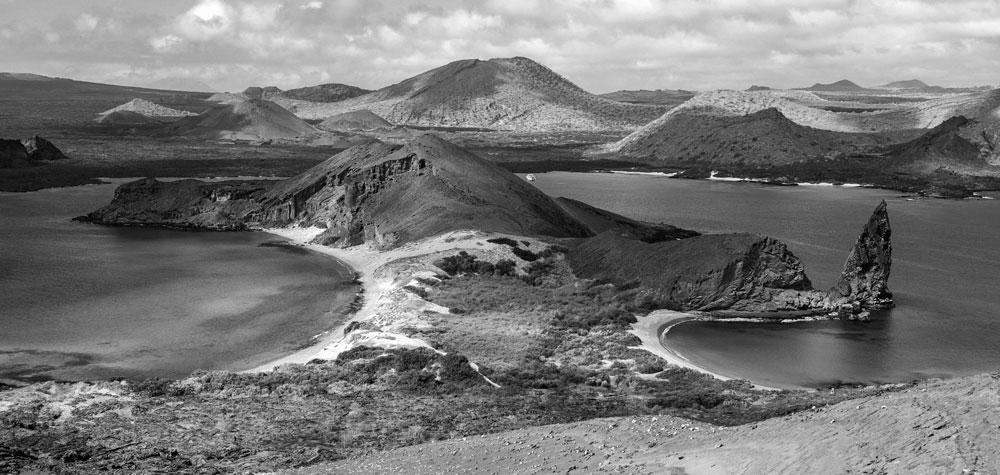Galapagos Island Risk
by Kara Lilly, Investment Strategist, Mawer Investment Management, via The Art of Boring Blog
“That will be $50, please.”
I nodded to the lady behind the front desk. “Just charge it to my room,” I replied. She handed me a slip with an access code, I put it in my pocket, and walked away. Fifty dollars was extortion given the meagre data plan I was receiving—but I had no alternative.
Last week, I visited Rarotonga, a tiny island in the South Pacific Ocean that is part of the Cook Islands. Rarotonga is so small that the road that wraps around the island is only 32.5 km. It is also a stunning place to visit; crystal blue waters encircle the island and a lush, tropical forest grows in its center. But for all its beauty, traveling there can be an exercise in patience: few businesses operate in Rarotonga and those that do face limited competition, which means there is hardly any pressure for companies to improve or innovate. Visitors face this reality almost immediately upon arrival.
As an example, there is only one telecom provider in Rarotonga. This lack of competition means that the provider can extract huge fees for their services. So steep is the price of data that one local millennial told me—with genuine despondency—that she only selectively posts to Instagram.
Restaurants also face much less competition. One night, my boyfriend and I went to a mid-upper scale Italian restaurant an hour and ten minutes before the posted closing time. We were denied seats, as there were no other customers and the staff wanted to go home. Instead, they encouraged us to take the pizza that another customer had yet to pick up! Clearly this is not how a restaurant who needs to have excellent customer service would behave, but it sometimes happens in Rarotonga because there are so few substitutes on the island. Where else are you going to go?
Indeed, there were many moments on the trip when we encountered a subtle difference in service quality, whether from retailers, restaurants or hotels. While some businesses were wonderful and bucked this trend, many did not. It seemed that a little competition might go a long way there—certainly, more was necessary to create the pressure necessary for improvement.
In our team, we sometimes call this Galapagos Island Risk1: the risk of living in a comfortable environment, becoming complacent, and then being unprepared when a threat comes along. Imagine you are an animal living in the Galapagos Islands, with no predators around to bother you. Life would seem pretty great…until some foreign ship lands on your shores, bringing with it a foreign predator. Then life would get very stressful, very quickly, and you would not likely have any defenses prepared because you haven’t been evolving. The shock of the new arrival could prove deadly.
This is an important risk to be aware of when considering potential investments. When a company exhibits high returns on capital, it might be due to competitive advantages and a strong management team, OR it could simply be due to the structure of the market. If a company’s high returns are driven by a cozy market structure, then it becomes important to understand the likelihood that this structure could change. Moreover, we need to recognize that the longer a company goes without competitive pressure, the more likely that management will rest on their laurels.
OPEC is a good example of an organization that was asleep on the island. For years, the Saudis reaped the rewards of sitting on vast oil fields that were cheap to extract. As my colleague Stanislav Lopata put it, the Saudis drained the oil and bought Ferraris. Meanwhile, hungry entrepreneurs in North America figured out ways to extract oil and gas from difficult environments, eventually doing so at a cost that made these resources competitive globally. While the Saudis are still in possession of significant assets, their global influence is nowhere near where it used to be. Overcoming years of cultural complacency will not be easy.
There is something to be said for a little struggle in life. Too much adversity can cripple us and yet some is essential to toughen us up and make us stronger. Complacency is often overcome, not by desire, but by necessity. In the case of business, a little competition is often exactly what we need to encourage improvement. It’s fine to enjoy the good times when they come, but you better hope that no predators show up.
In the case of Rarotonga, the risk of new entrants disrupting the local industry is muted. Who is going to specifically target an island of 10,000 people that is 32.5 km in circumference? But if they ever do, that Italian restaurant better watch out.
1 Unfortunately, we’ve used this mental model in our team for quite some time now and can’t quite recall whether it originated within our group or from someone else (perhaps Charlie Munger). If other readers have come across it too, we would be eager to provide the proper attribution.
This post was originally published at Mawer Investment Management















